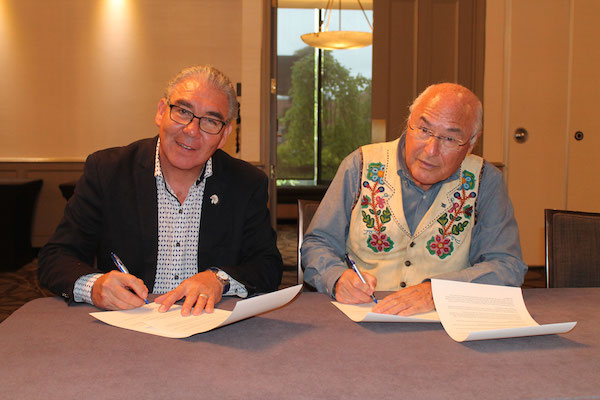The Assembly of Nova Scotia Mi’kmaq Chiefs and the Metis National Council have signed a document that establishes they respect each other’s nationhood, a move that appears to be a calculated response to the rise in the number of people who choose to identify themselves as eastern Metis.

A press release announcing the memorandum of understanding, says there is a growing and divisive trend across Canada of people self-identifying as Metis — especially in Eastern Canada.
Census data show the number of people who call themselves Metis soared nearly 150 per cent in Quebec and 125 per cent in Nova Scotia from 2006 to 2016, according to Statistics Canada.
READ MORE: The controversial rise of the eastern Metis
The Canadian Press has reported that dozens of new Metis organizations cropped up over the same period, many of whom use identity cards that look much like Indian Status cards.
Others have tried to claim Indigenous rights through the courts, fuelling a perception that the aboriginal newcomers are so-called rights grabbers.
Both Nova Scotia Mi’kmaq Chiefs and the Metis National Council say they have concerns about the rising trend.
“The only rights holders in Nova Scotia are the Mi’kmaq,” said Chief Terrance Paul, co-chair for the Assembly, in a press release.

Get breaking National news
“We are the original peoples of these lands, and we have spent decades establishing our Treaty and Aboriginal Rights and then working on the implementation of these rights.”
The Metis National Council says there is a clear process of identifying and registering citizens of the Metis Nation.
“The right to determine our own identity and citizenship is at the heart of our self-determination and self-government in our historical homeland,” said Clément Chartier, president of the Metis National Council.
“It took decades of struggle for this right to be recognized by the federal government and Supreme Court of Canada and we defend it vigilantly.”
For those who consider themselves eastern Metis, the rejection of their identity is exclusionary and mean-spirited — a continuation of their oppressed status and the maltreatment mixed-raced people have faced for generations.
READ: Gabriel Sylliboy pardon now on full display at Nova Scotia’s Province House
They argue that a distinct mixed-heritage people existed in the region with a shared history and culture, not simply Indigenous ancestry. But these interracial people were compelled to identify as white for fear of discrimination.
“We were forced to assimilate with white people, our identities stolen,” Mary Lou Parker, the grand chief of the Eastern Woodland Metis, told the Canadian Press earlier this year. “Now we’re reclaiming our native heritage.”
But both the Nova Scotia Mi’kmaq Chiefs and the Metis National Council appear ready to reject those claims.
They say they plan to create a working group to collaboratively address the issue of individuals claiming Metis ancestry in Nova Scotia.
“The Mi’kmaq of Nova Scotia will define for themselves who is Mi’kmaq in Nova Scotia,” the agreement signed on Sept. 27 says.
“The (Metis National Council) and its governing members have defined for themselves who is Metis and the process of citizenship.”
The memorandum of understanding says only these two groups have the right to recognize and define citizenship within their respective nations.
The groups also aim to establish cultural awareness initiatives to educate the public.
With files from the Canadians Press
- Carney says Canadian military participation in Middle East war can’t be ruled out
- More than half of small businesses say U.S. no longer reliable: CFIB data
- The Bank of Canada says these are the 3 warning signs for mortgage default
- Canadians want floor-crossing MPs to face ‘immediate’ byelections: poll













Comments
Want to discuss? Please read our Commenting Policy first.